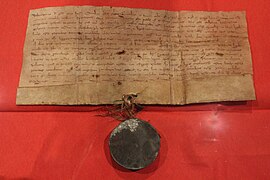
Back Stadsregte Afrikaans Stadtrecht ALS امتيازات البلدة Arabic Drets de ciutat Catalan Městské právo Czech Stadsret Danish Stadtrecht German Προνόμια πόλης Greek Urborajto Esperanto Linnaõigus Estonian
This article needs additional citations for verification. (September 2024) |


Town privileges or borough rights were important features of European towns during most of the second millennium.[1][2] The city law customary in Central Europe probably dates back to Italian models, which in turn were oriented towards the traditions of the self-administration of Roman cities.
Judicially, a borough (or burgh) was distinguished from the countryside by means of a charter from the ruling monarch that defined its privileges and laws.[2][3][4] Common privileges involved trade (marketplace, the storing of goods, etc.) and the establishment of guilds. Some of these privileges were permanent and could imply that the town obtained the right to be called a borough, hence the term "borough rights" (German: Stadtrecht; Dutch: stadsrechten). Some degree of self-government, representation by diet, and tax-relief could also be granted.[1][2] Multiple tiers existed; for example, in Sweden, the basic royal charter establishing a borough enabled trade, but not foreign trade, which required a higher-tier charter granting staple right.
- ^ a b Cite error: The named reference
blockmanswas invoked but never defined (see the help page). - ^ a b c Cite error: The named reference
whittockwas invoked but never defined (see the help page). - ^ Cite error: The named reference
dymondwas invoked but never defined (see the help page). - ^ Cite error: The named reference
heibautwas invoked but never defined (see the help page).